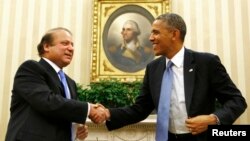ISLAMABAD —
Pakistani Prime Minister Nawaz Sharif’s meeting with U.S. President Barack Obama this past week came at a time when the two countries have been trying to repair relations, damaged by U.S. drone strikes against militants in Pakistan.
Pakistani officials and commentators believe the talks have set the stage for rebuilding "an honorable relationship."
Officials in Islamabad sound upbeat about the outcome of Wednesday’s meeting Prime Minister Sharif held with President Obama at the White House.
Foreign Ministry spokesman Aizaz Ahmad Chaudhry says the talks have established a framework that would help the two countries enhance counterterrorism efforts and clear the way for Pakistan to seek more U.S. cooperation in areas such as the economy.
Chaudhry said, “I think they have provided a very solid guidance for rebuilding this relationship, taking it out of the depth that it had seen in the last two years to hopefully new heights.”
The tensions in bilateral relations plunged to historic lows in 2011 and 2012 after an American military raid deep inside Pakistan killed Osama bin Laden and a cross-border NATO airstrike killed some two dozen Pakistani soldiers.
But critics, like opposition lawmaker Shireen Mazari, are unhappy with the way Mr. Sharif presented Pakistan’s case in the meeting with President Obama.
“The American president seem to have overpowered the Pakistani prime minister who had the backing of all the political parties, the Pakistani nation, to make an issue and demand, not request, demand that America stop its drone attacks or else," said Mazari. "But he never did that. Then he was going to request market access for Pakistan’s trade, he never got that. So, at the end of the day, what did he get? A scolding from ((President)) Obama because afterwards he said we must put our own house in order.”
Still, opposition Senator Mushahid Hussain, who chairs the foreign affairs committee of the upper house of parliament, says that the meeting has generated hopes the two countries will be able to resolve long-standing acrimonious issues.
Hussain said, “I would say that as compared to what the situation was in 2011 we are in a much better shape and there is a change in the U.S. attitude. I think there is a mutual desire to take the relationship forward. So, I am hopeful that some of the problems that we had in the past are now behind us.”
Hussain admits there are weaknesses in Pakistan’s counterterrorism campaign.
“Ultimately, at the end of the day there are serious internal situations, particularly the need for a national security strategy and a counterterror strategy, which Pakistan and its political leadership along with support of the armed forces has to fashion on its own. So, the problems the mess that we have nobody else will clean it up for us. We have to do it ourselves,” said Hussain.
Pakistani officials say that the issue of U.S. forces in Afghanistan was also raised in the Obama meeting. Most of the American-led foreign forces will leave Afghanistan by end of next year and they are heavily relying on Pakistani land routes for their exit.
Pakistani officials and commentators believe the talks have set the stage for rebuilding "an honorable relationship."
Officials in Islamabad sound upbeat about the outcome of Wednesday’s meeting Prime Minister Sharif held with President Obama at the White House.
Foreign Ministry spokesman Aizaz Ahmad Chaudhry says the talks have established a framework that would help the two countries enhance counterterrorism efforts and clear the way for Pakistan to seek more U.S. cooperation in areas such as the economy.
Chaudhry said, “I think they have provided a very solid guidance for rebuilding this relationship, taking it out of the depth that it had seen in the last two years to hopefully new heights.”
The tensions in bilateral relations plunged to historic lows in 2011 and 2012 after an American military raid deep inside Pakistan killed Osama bin Laden and a cross-border NATO airstrike killed some two dozen Pakistani soldiers.
But critics, like opposition lawmaker Shireen Mazari, are unhappy with the way Mr. Sharif presented Pakistan’s case in the meeting with President Obama.
“The American president seem to have overpowered the Pakistani prime minister who had the backing of all the political parties, the Pakistani nation, to make an issue and demand, not request, demand that America stop its drone attacks or else," said Mazari. "But he never did that. Then he was going to request market access for Pakistan’s trade, he never got that. So, at the end of the day, what did he get? A scolding from ((President)) Obama because afterwards he said we must put our own house in order.”
Still, opposition Senator Mushahid Hussain, who chairs the foreign affairs committee of the upper house of parliament, says that the meeting has generated hopes the two countries will be able to resolve long-standing acrimonious issues.
Hussain said, “I would say that as compared to what the situation was in 2011 we are in a much better shape and there is a change in the U.S. attitude. I think there is a mutual desire to take the relationship forward. So, I am hopeful that some of the problems that we had in the past are now behind us.”
Hussain admits there are weaknesses in Pakistan’s counterterrorism campaign.
“Ultimately, at the end of the day there are serious internal situations, particularly the need for a national security strategy and a counterterror strategy, which Pakistan and its political leadership along with support of the armed forces has to fashion on its own. So, the problems the mess that we have nobody else will clean it up for us. We have to do it ourselves,” said Hussain.
Pakistani officials say that the issue of U.S. forces in Afghanistan was also raised in the Obama meeting. Most of the American-led foreign forces will leave Afghanistan by end of next year and they are heavily relying on Pakistani land routes for their exit.












